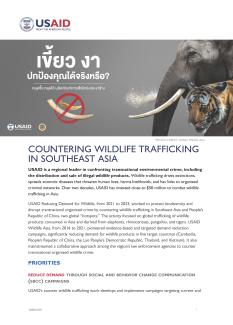USAID is a regional leader in confronting transnational environmental crime, including the distribution and sale of illegal wildlife products. Wildlife trafficking drives extinctions, spreads zoonotic diseases that threaten human lives, harms livelihoods, and has links to organized criminal networks. Over two decades, USAID has invested close to $50 million to combat wildlife trafficking in Asia.
USAID Reducing Demand for Wildlife, from 2021 to 2023, worked to protect biodiversity and disrupt transnational organized crime by countering wildlife trafficking in Southeast Asia and People’s Republic of China, two global “hotspots.” The activity focused on global trafficking of wildlife products consumed in Asia and derived from elephants, rhinoceroses, pangolins, and tigers. USAID Wildlife Asia, from 2016 to 2021, pioneered evidence-based and targeted demand reduction campaigns, significantly reducing demand for wildlife products in five target countries (Cambodia, People’s Republic of China, the Lao People’s Democratic Republic, Thailand, and Vietnam). It also mainstreamed a collaborative approach among the region’s law enforcement agencies to counter transnational organized wildlife crime.
PRIORITIES
Reduce demand through social and behavior change communication (SBCC) campaigns
USAID’s counter wildlife trafficking work develops and implements campaigns targeting current and potential consumers, with messages to change attitudes, social acceptability, and desirability of wildlife products. By establishing principles for maximizing the potential for SBCC techniques to reduce demand for wild meat and wildlife products, similar campaigns can be replicated across the region to curb a significant pathway for exposure to zoonotic pathogens and spillover.
Reduce supply through comprehensive regulations, rational enforcement systems
USAID convenes policymakers, legislators, enforcement officials, prosecutors, and judges to review the region’s wildlife regulatory and enforcement systems, and also works to secure commitments by governments to end wildlife crime. This is primarily done through regional bodies, such as the working groups of the Association of Southeast Asian Nations (ASEAN) Secretariat, the ASEAN Inter-Parliamentary Assembly (AIPA), ASEAN Chiefs of National Police (ASEANAPOL), and the Asian Judges Network for the Environment. Working with Interpol, the ASEAN National Police, and the ASEAN Working Group on the Convention on International Trade in Endangered Species and Wildlife Enforcement, USAID trains regional police, customs agents, and prosecutors to effectively locate, apprehend, and prosecute illegal wildlife traffickers.
KEY RESULTS
- Launched 11 campaigns under Wildlife Asia, resulting in a 50 percent drop in consumer intent to purchase wildlife products and a 30 percent decrease in social acceptability of these products, while leveraging $19.7 million in earned media value.
- Implemented five SBCC campaigns through Reducing Demand for Wildlife that garnered over 24 million views and leveraged $1 million in in-kind support.
- Conducted five interrelated studies to address some of the significant knowledge gaps hampering efforts to tackle the illegal wildlife trade. The studies leveraged cross-sectoral efforts and provided direction for expanding participation of stakeholders in counter wildlife trafficking efforts, including civil society and local communities.
- Advanced ten progressive laws and policies towards counter wildlife trafficking that introduced dramatic increases in fines and sentencing for wildlife crime.
- Mainstreamed the collaborative approach among law enforcement agencies to countering transnational organized wildlife crime, with officials from 137 law enforcement agencies from 24 countries trained across Asia and Africa.
- Developed the Pangolin Species Identification Guide, in English and ten key local languages, to standardize law enforcement’s identification of eight pangolin species and related illegal products.
- Supported Lao People’s Democratic Republic’s adoption of the National Ivory Action Plan 2019-2022.
- Scaled Thailand’s efforts to counter wildlife trafficking through legislative reforms, policy, and legislative analysis, resulting in the endorsement of recommendations by the National Legislative Assembly in 2017.


